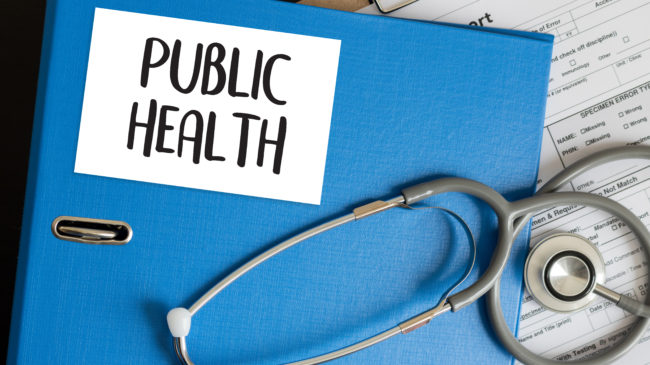It is understandable that, in the current COVID-19 health emergency, nurses, physicians and other health care providers are appreciated and popular. Experts in so-called public health benefit from this popularity and trust, although the humongous failures of public health organizations such as the Centers for Disease Control and Prevention (CDC), Food and Drug Administration (FDA), as well as the World Health Organization (WHO), should raise serious doubts about their effectiveness.
What is public health? Probably not what most people think it is. Although some of its experts and activists cloak themselves in the mantle of science, many might be surprised to learn that it is mainly a political movement with a specific ideology. This concept is recognized in one of the most popular textbooks of public health, Bernard Turnock’s Public Health: What It Is and How It Works (5th edition, Jones & Bartlett Learning, 2012), p. 22), which says, “In many respects, it is more reasonable to view public health as a movement than as a profession.”
One characteristic of this movement is to largely ignore the insights of economics. For example, economics teaches that, in the real world, every good or activity has a cost—that is, it prevents something else from being produced, consumed, or done. Things are scarce. Even if the monetary cost of doing something may occasionally seem low, the time doing it cannot be spent doing something else profitable or enjoyable.
Public health theorists typically ignore that their proposed interventions have costs. Perhaps they have an interest, if only ideological, in hiding the costs. Or, they choose not to think in these terms. Turnock (6th edition of the same textbook, 2016, p. 320) writes, “The argument that resources are limited and that there simply are not adequate resources to meet treatment, as well as prevention purposes, is uniquely American and quite inimical to the public’s health.”
This is an obviously non-sensical statement. Every individual has to make trade-offs between his health and other goods and pleasures; no individual spends all his resources on his health. There is nothing uniquely American about this. On the contrary, Americans spend more on health care than the people of any other rich country, and about half of that is spent voluntarily (outside of Medicare and Medicaid). When resources are allocated by the state, costs don’t miraculously disappear. They are simply and forcibly transferred to certain sections of the population, who have therefore less to consume. These costs must be recognized.
More sensibly, the Stanford Encyclopedia of Philosophy notes that “[p]ublic health resources are always in short supply and priority setting in public health policy and practice is always morally challenging” (Ruth Faden and Sirine Shebaya, “Public Health Ethics”). It is also economically challenging. From all we know, markets are generally more efficient than governments in allocating resources and producing goods and services. In fighting malaria in Africa, for example, it appears that governments overdistribute insecticide-treated bed nets in big cities and under-distribute them in the countryside. Moreover, compared to other means of fighting the disease, too much money is spent on bed nets, “partly because nets are easy to count—a feature that aid programs are particularly found of” (“Malaria Infections Have Stopped Falling,” The Economist, December 5, 2019).
Perhaps we can hope that the current economic crisis will instill in the public-health movement the idea that the interventions they propose carry costs that are paid by ordinary people in taxes or reduced economic growth. But don’t count on it.
Not only do public health theorists and experts generally ignore the inconvenient discipline of economics, but they nearly always ignore its public choice component. Public choice analysis is a strand of economics, developed over the past seven decades, that analyzes how politicians, bureaucrats and voters make decisions. One would think that this sort of analysis would be crucially important for a public-health movement that typically favors public choices, that is, government decisions, over private choices.
Turnock’s textbook does not even mention public choice economics, while its topic is basically the public choices made in health matters. If he had taken this strand of economic analysis into account, he might not be so surprised by “the lost opportunities in securing and using recent tobacco settlement … to shore up a sagging public health infrastructure” (Public Health, 6th edition, p. 320).
In fact, state governments securitized future payments and often spent the money on their pet projects because such was the interest of politicians and special interest groups. This political naivety adds to the temptation of simply ignoring costs.
The ideology of the public health movement is summarized by Turnock, who writes that “[s]ocial justice is the foundation of public health” (Public Health, 6th edition, p. 19). In the public-health vision, social justice can justify government interventions in virtually any private choice. Professor Gerard Hastings of Stirling University writes in a medical journal that “lethal though tobacco is, the harm done to public health by our economic system is far greater.” Marketing, he claims, “undermines our mental as well as our physical well-being” and, when done by multinationals, presents “a major threat to public health.” (“Why Corporate Power Is a Public Health Priority,” BMJ, 2012)
Measures being taken now to fight COVID-19, such as forcing the shutdown of businesses deemed non-essential and imposing home quarantines, might be justified or not. But it is certainly not possible to appraise these measures, or even think about them, without examining their total costs.
Even in the current crisis, especially in this case, it is certainly risky to let Leviathan (the powerful state) and public health advisors loose without any restraint. The aim here is not to deny that the coronavirus pandemic is a serious one, but to point out that the natural biases of politicians, bureaucrats and public health movement have the potential to influence policies that cause damage and thus should be factored into the overall analysis of policy decisions.
